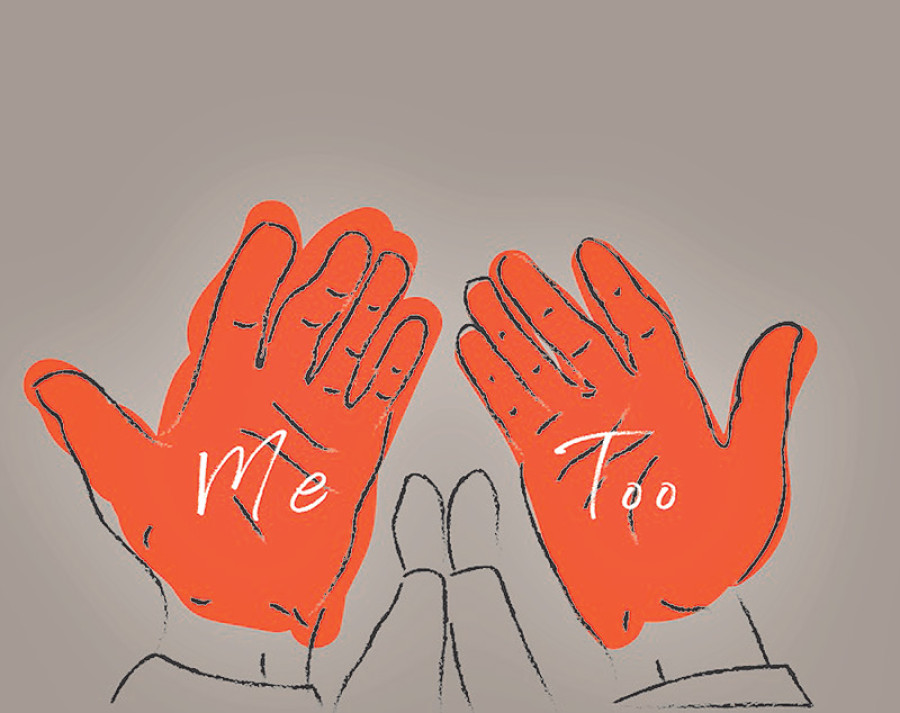Thu, Mar 5, 2026
Opinion
Part of the problem
As #MeToo gains prominence in Nepal, men must check their privilege
bookmark
Bikash Gupta
Published at : November 20, 2018
Updated at : November 20, 2018 07:56
In recent months, the #MeToo movement has been gaining steam in South Asia and Nepal. In a highly patriarchal society—where constitutional legislation implicitly and explicitly favours men over women—fighting becomes an uphill task. Those seeking to upend the system must also combat deep-seated societal norms that the structure perpetuates and advances. The repercussions of publicly naming and shaming individuals, especially in such a system, becomes exponentially high and can cost survivors their jobs and induce reverse social marginalisation.
Recently a female alumna of my high school took to our school Facebook group to report sexual misconduct by a fellow male alumnus-inspiring various other female alumni to come forward and share their school-time stories of how boys mistreated them, and how these experiences have had lasting effects. Yet the #MeToo cases we scroll through on our social media feeds represent only the tip of this rising iceberg. Nepali society, which is highly patriarchal, routinely normalises sexual violence and harassments against women. Nepali men of all backgrounds should publically raise their voices against issues being raised by the movement in order for us to truly refer to ourselves as ‘allies’. Men like me, actively or complicity, let this long-winding nexus continue through generations. Such normalisation takes place in obvious ways with a steady chipping away of women’s rights while simultaneously amassing increments to male privileges.
I was born and raised in Siraha. As the third son in a family without any daughters, I was often on the receiving end of jokes that pointed out the collective dowry-producing potential of my family. My uncle and aunt’s family, on the other hand, were purview to different kinds of jokes. Despite being proud parents of three daughters, they would be routinely advised by relatives and strangers alike to start arranging money for dowries before they were too old to work. The accumulation of stress is one of the many reasons why my uncle was forced into back-bending work as a laborer in Saudi Arabia.
Men rarely check their privilege when reflecting on the gravity of the situation. It then goes without saying that they are constantly told to strive while women are made to settle. No wonder boys like me received more hours of study time and were able to travel extensively either for education and work purposes in parts of town, supposedly unsafe for women, and make advancements in our lives. For girls, freedoms diminished as they reached Grade 10. As we approached S.L.C, my female peers began disappearing from my classrooms.
This is a story of an unjust society that favored men at the cost of women to uphold patriarchy, and boys like me have benefitted extensively growing up and were blinded by ignorance, privilege, and entitlement. Women on top were considered anomalies, and later on, were mocked as pieces of a quota than appreciated for their capacity.
On the other side, as the worlds of women in my life shrunk, mine expanded. Though I stayed most of the time in my home, I would see my seniors and boys roaming on the streets as if they owned the public sphere and teasing girls they would find. Expressing love on the wall was considered a demonstration of bravery, not cowardice or creepiness that would continually beget discomfort among the girls. Bollywood movies were an inspiration. ‘No’ never meant ‘no’ for boys but just a yes-in-waiting. At least that’s what those Bollywood songs taught us, right?
As I grew up, I also saw how the public sphere slowly started becoming devoid of girls our age. We routinely perpetuated the same narratives other men in our lives had passed on to us-women had to be protected, women had to be cared for, women had to be guided-without questioning how our actions were making assumptions about and thereby limiting the capacity of women. Yet perversely, if something were to happen to girls, the blame was squarely placed on them. In marriages that were fraught with incidents of drunk husbands beating wives, the families asked wives to tolerate the violence and would prey off the pain. The double standard of the society was reflected on ‘Orchestra’ nights, pronounced colloquially as ‘RKXTRA’, when debauched men, leaving behind their mothers, wives, sisters, or daughters, would walk or cycle miles to come and watch young girls dance in short clothes. The next day, everybody would talk about the dance and not about how our actions were contributing to the hypersexualisation of women’s bodies and the exploitation of female workers.
Reported data has shown that the violence against women has hardly declined in years. In 2016, a total of 2,910 cases were reported. In the same year, Nepal Police documented 32 percent of registered cases revolved around physical violence against women, dealing with cuts and bruises, and about 12 percent dealt with eye injuries, sprains, dislocations, and burns. Domestic violence was noted to be more in Terai (32 percent) compared to the Hilly region (less than 20 percent). In terms of gender, our society is so unequal that we rank worst than half of the nations on the global inequality index. Nowhere are these issues more apparent than in rural areas, where lives of women are confined to a plot of land and normalised forms of physical, emotional and structural violence. As #metoo takes pace, it is necessary for men to dig deeper and identify inequalities that exist in their lived realities—systematically, socially, economically, and culturally.
For men like me, the ways we can topple patriarchy begins with how we confront these issues at our own homes: dividing the insane workload females in the house have to do, for example. We have to make sure women are heard, respected, and included in the decision-making process. We need to ensure that there is an adequate representation of women in the public sphere and that more women graduate high schools and enroll in colleges so that the successive generations have an ever-expanding pool to look up to. We cannot be allies unless we work with women, and hear where we pose barriers, where we mansplain, and where we need to correct ourselves. Our engagement in this movement will decide the extent to which the future of our society will be fairer and equitable.
Toppling patriarchy may take time. Men should check their privileges and assist women champions to advocate for an equal society. This conversation must be led by women but supported—unequivocally, unwaveringly and vociferously—by Nepali men who call themselves ‘allies’.
Gupta is currently pursuing his undergraduate at Soka University of America, CA.
Most Read from Opinion
Editor's Picks
Can Gagan Thapa convince Nepal that experience still matters?
How Facebook’s algorithm is amplifying one party over all others
Five and half decades of KP Oli in Nepali politics
Nepal’s IT exports near $1 billion. Can the momentum be sustained?
Parties’ lofty pledges on economy collide with hard realities
E-PAPER | March 05, 2026
×




 27.41°C Kathmandu
27.41°C Kathmandu





.jpg&w=200&height=120)





